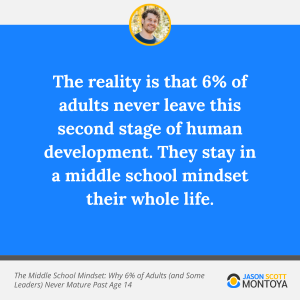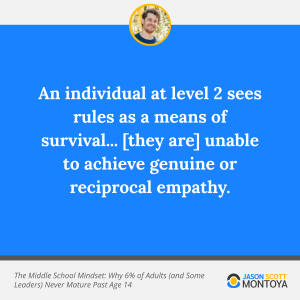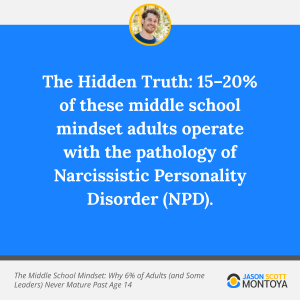
The Middle School Mindset: Why 6% of Adults (and Some Leaders) Never Mature Past Age 14
"You don’t want your child to be Little God Emperor of the Universe." - Jordan B. Peterson
For your parents out there, imagine if your middle school child never grew out of that natural developmental stage and never matured into a young adult. It'd be highly problematic and possibly catastrophic, depending on their level of authority as an adult.

The reality is that 6% of adults never leave this second stage of human development. They stay in a middle school mindset their whole life. It's estimated that 15–20% of these middle school mindset adults operate with the pathology of Narcissistic Personality Disorder (NPD), which corresponds to about 1% of the total US population.
For a population as large as America, that is a lot of selfish people, many of whom are actively exploiting others. When these types of people are put in places of authority, they'll leverage that authority to fulfill their needs and desires, often causing havoc for those in their wake.
In this article, I want to explain this middle school mindset and how it differs from the stage that follows (the socialized mind). This stage is normal for a middle schooler, but when that individual does not move out of this stage, as an adult, it stops being normal and starts being highly problematic with consequences.
What Is the Self-Sovereign Mind (Level 2 of Robert Kegan's Constructive Developmental Theory)?
As humans, based on our level of maturity, we are controlled by dynamics that have a hold over us. We are unable to examine and control these dynamics; we're simply subject to them. These dynamics are the fundamental elements that shape our level of maturity. What we have control over and what has control over us determines how mature we actually are
Someone who is in middle school is subject to their needs and desires (while having control over their impulses). Their job is getting what they need and want. Other people are simply vehicles for them to get what they want or obstacles that prevent them from getting what they want. Following the rules is about getting rewarded and avoiding punishment. Self-interest and direct consequences are the core motivations. This stage, in Constructive Developmental Theory (Robert Kegan), is known as self-sovereign or level 2 (out of 5 levels).
The subsequent developmental stage (3) is the socialized mind. This is where someone can escape being controlled by their personal needs and wants and add a layer of relational belonging. Identity comes from being a good role player to someone else (good student, good spouse, etc), not simply about getting what we want or need. People in this socialized stage of development align with the values of the tribe. The group (and more importantly, its leaders) directs individuals. Those who participate in the group follow the rules out of a concern for their relationships and a fear of alienation. The driving motivation is belonging. Deviating from group norms triggers internal feelings of guilt or shame, as they have internalized the group's values. This person doesn't choose their values; they adopt their group's values.
This dynamic is, in large part, why many people adopt the religious and political beliefs of their parents and community and why it's difficult for them to escape them when they clash. To step outside of the beliefs and norms of those in our group can come at a great cost, and that cost is hard to bear when we are in stage 3 of adult development. That type of shift requires the self-authored mind (stage 4), which usually is not something we move into until mid-life. What happens instead is these individuals who feel trapped change communities so they are part of a group that holds those values, thus providing safety and alignment in the new group.
Externally Motivated in Stage 2 and 3
It's important to know, people at both level 2 and 3 stages of adult development are primarily externally shaped. They are not self-authored by what controls them; they are instead shaped by the forces that press in upon them. Keith Eigel uses the phrase “outside-in” inside his book, The Map.
An individual at level 2 sees rules as a means of survival. In contrast, a person at level 3 has internalized values as part of belonging to a group, which makes them able to empathize with others. In contrast, a level 2 individual is unable to achieve genuine or reciprocal empathy.
If you'd like to explore these stages further and also understand levels 4 and 5, check out my introduction to Constructive Developmental Theory here or watch the summary video above.
A middle schooler in a normal family will outgrow this level 2 dynamic and move towards stage 3, recognizing that life is not just about them. They finally realize that their needs can be met by collaborating with the community (often because they've had many positive experiences where this is the case).
Knowing that people are in these stages, heavily shaped by external forces, allows us to foster the types of experiences that will help them grow in healthy ways.
And, it's important to realize that once we move to stage 3, we don't lose the dynamics gained from getting to stage 2; we still have wants and needs. The difference is that those needs and desires are not fundamental to our identity, and we're able to more effectively control them (instead of being controlled by our desires).
Before I jump into how you can encourage that growth, here's another insight from Google Gemini on the difference between stages 1, 2, and 3.
- “Level 1: Cannot distinguish self from current impulse/feeling.
- Level 2: Can manage impulses, but cannot step back from their own selfish needs.
- Level 3: Can manage personal needs, but cannot step back from the expectations of their social group.”
How To Encourage Growth For Those in the Second Level of Adult Development
If you are a parent or leading someone in this self-sovereign stage, it's important to provide clear black and white consequences and direction. People at this second level of development can't understand abstraction or appreciate longer-term goals that require sacrificing the immediate for a bigger future benefit. You want to help people at this stage see their personal loss (money, status, safety, etc) for operating in problematic ways and the advantages of operating in healthy ways. Use black and white framing with them that is not abstract in any way.
As a positive encouragement towards level 3 of development, offer these individuals highly structured and rule-guided groups where collaboration yields more benefits than selfishness. We want them to experience how working with others creates more of what they want, and that will help them pivot from their more narrow-focused perspective. Larger families, school, church, and sports are some of the many great ways to facilitate these types of experiences.
If you’re a parent, this stage can be extremely frustrating and difficult. It can feel hopeless because you have rules, but your child keeps hitting up against them and trying to get around them. Remember, their goal is to get what they need and want, and when you or your rules are an obstacle, they will try to go through or around them.
As upsetting as this process can be, this is to be expected. Set your expectation that there will be a high level of tension. They are focused on getting what they want, so when they break the rules and lose what they want, it will upset them deeply. To them, it can feel like the end of the world. This is why it’s important to give them clear direction and rules to follow to get what they want. This way, they follow the direction you’re giving them instead of trying to get what they want through other undesirable means.
Additionally, you want to structure things so that the process of getting what they want involves working with others and considering those people’s wants and needs. This helps facilitate their growth. As they leave stage 2 and move into stage 3, you’ll have more resources to help them become better versions of themselves and society. But this growth will also introduce other challenges you’ll need to contend with and overcome.
Here are a few more closing insights from Google Gemini about those in stage 2 of development.
“Level 2 View of Others and Relationships:
- Instrumental: Can recognize others have separate needs/feelings, but only cares about them as far as they serve the self.
- Transactional: People are a means to get one's own needs met. Relationships are based on concrete exchanges.
View of Truth and Lies (Morality):
- External Consequences: Rules are followed (or lies avoided) solely to gain reward or avoid punishment/retaliation.
- Fear of getting caught and facing a loss/punishment.
Sense of Self and Identity:
- Defined by personal needs: "I am my needs and desires."
- Seeks to control the environment to satisfy needs.
- Driven by personal agenda; a competition of wills.”
Share on Social Media
























